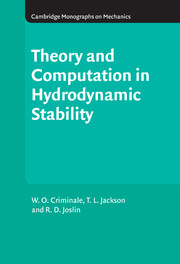Book contents
- Frontmatter
- Contents
- Figures
- Tables
- Preface
- 1 Introduction and problem formulation
- 2 Temporal stability of inviscid incompressible flows
- 3 Temporal stability of viscous incompressible flows
- 4 Spatial stability of incompressible flows
- 5 Stability of compressible flows
- 6 Centrifugal stability
- 7 Geophysical flow
- 8 Transient dynamics
- 9 Nonlinear stability
- 10 Transition and receptivity
- 11 Direct numerical simulation
- 12 Flow control and optimization
- 13 Investigating hydrodynamic instabilities with experiments
- References
- Author index
- General index
8 - Transient dynamics
Published online by Cambridge University Press: 06 July 2010
- Frontmatter
- Contents
- Figures
- Tables
- Preface
- 1 Introduction and problem formulation
- 2 Temporal stability of inviscid incompressible flows
- 3 Temporal stability of viscous incompressible flows
- 4 Spatial stability of incompressible flows
- 5 Stability of compressible flows
- 6 Centrifugal stability
- 7 Geophysical flow
- 8 Transient dynamics
- 9 Nonlinear stability
- 10 Transition and receptivity
- 11 Direct numerical simulation
- 12 Flow control and optimization
- 13 Investigating hydrodynamic instabilities with experiments
- References
- Author index
- General index
Summary
The initial-value problem
The fundamental needs for specifying an initial-value problem for stability investigations are not in any way different from those that have long since been established in the theory of partial differential equations. This is especially true in view of the fact that the governing equations are linear. Thus, by knowing the boundary conditions as well as the particular initial specification, the problem is, in principle, complete. Unfortunately, in this respect, classical theory deals almost exclusively with second order systems and, as such, few problems in this area can be cast in terms of well known orthogonal functions. For the equations that are the bases of shear flow instability, however, it is only the inviscid problem that is second order (Rayleigh equation) and even this limiting equation does not have a detailed set of known functional solutions. The more serious case where viscous effects are retained, then the minimum requirement is an equation that is fourth order (Orr-Sommerfeld equation) and even this, as previously noted, is fortuitous. An a priori inspection would have led one to believe that the full three-dimensional system should be sixth order, such as that discussed for the case of the Ekman boundary layer, for example. The net result is one where there are neither known closed solutions nor mutual orthogonality. It is only the accompanying Squire equation, where the solutions are coupled to those of the Orr-Sommerfeld equation, that eventually makes for sixth order.
- Type
- Chapter
- Information
- Theory and Computation of Hydrodynamic Stability , pp. 229 - 262Publisher: Cambridge University PressPrint publication year: 2003

